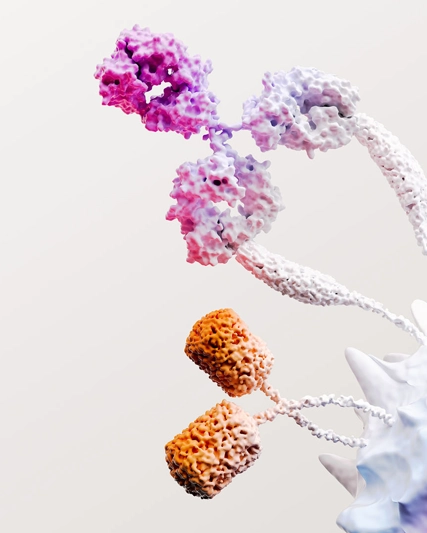Issued: London, UK
For media and investors only
Jemperli (dostarlimab) plus chemotherapy approved in the US as the first new frontline treatment option in decades for dMMR/MSI-H primary advanced or recurrent endometrial cancer
- Jemperli is the only immuno-oncology treatment approved in the frontline setting for this patient population in combination with chemotherapy
- Patients with this type of endometrial cancer face significant unmet need and typically experience poor long-term outcomes with the current standard of care
GSK plc (LSE/NYSE: GSK) today announced that the US Food and Drug Administration (FDA) has approved Jemperli (dostarlimab) in combination with carboplatin and paclitaxel, followed by Jemperli as a single agent for the treatment of adult patients with primary advanced or recurrent endometrial cancer that is mismatch repair deficient (dMMR), as determined by an FDA-approved test, or microsatellite instability-high (MSI-H). The supplemental Biologics License Application (sBLA) supporting this new indication received Priority Review and was approved ahead of the Prescription Drug User Fee Act action date.
Hesham Abdullah, Senior Vice President, Global Head of Oncology Development, GSK, said: “Today’s expanded approval of Jemperli redefines the treatment landscape for patients with dMMR/MSI-H primary advanced or recurrent endometrial cancer. Until now, chemotherapy alone has been the standard of care with many patients experiencing disease progression. In the RUBY trial, Jemperli plus chemotherapy demonstrated a 71% reduction in the risk of disease progression or death versus chemotherapy in this patient population, providing a statistically significant and clinically meaningful benefit. These results and today’s approval underscore our belief in the potential for Jemperli to transform cancer treatment as a backbone immuno-oncology therapy.”
With this approval, Jemperli is now indicated earlier in treatment in combination with chemotherapy for patients with dMMR/MSI-H primary advanced or recurrent endometrial cancer. Jemperli is already approved in the US as monotherapy in adult patients with dMMR recurrent or advanced endometrial cancer that has progressed on or following a prior platinum-containing regimen in any setting and are not candidates for curative surgery or radiation.
Matthew Powell, MD, Chief, Division of Gynecologic Oncology, Washington University School of Medicine, and US principal investigator of the RUBY trial said: “As a clinician, I celebrate the practice-changing potential of adding Jemperli to chemotherapy for patients with dMMR/MSI-H primary advanced or recurrent endometrial cancer who have had limited treatment options. Based on the results from the RUBY clinical trial, I look forward to the addition of Jemperli to chemotherapy becoming a new standard of care for patients.”
Wenora Johnson, President, Board of Directors, Facing Our Risk of Cancer Empowered (FORCE) said: “The endometrial cancer community is thrilled by today’s news, which changes the treatment paradigm for a population with long-term unmet needs. FORCE is grateful for the many participants and researchers who contributed to this important study. As an endometrial cancer survivor, I know how much this approval offers hope for patients with primary advanced or recurrent dMMR/MSI-H endometrial cancer.”
The FDA approval is supported by interim analysis results from Part 1 of the RUBY/ENGOT-EN6/GOG3031/NSGO phase III trial, which reflect a robust median duration of follow-up of ≥ 25 months. The trial met the primary endpoint of investigator-assessed progression-free survival (PFS), demonstrating a statistically significant and clinically meaningful benefit in patients treated with Jemperli plus carboplatin and paclitaxel in the dMMR/MSI-H population. In the dMMR/MSI-H population, a 71% reduction in the risk of disease progression or death was observed. Part 1 of the RUBY trial continues to assess overall survival (OS) in the intent-to-treat (ITT) population, a dual-primary endpoint alongside investigator-assessed PFS.
The safety and tolerability profile for Jemperli plus carboplatin and paclitaxel was generally consistent with the known safety profiles of the individual agents. The most common treatment-emergent adverse events (≥ 20%) in patients receiving Jemperli plus chemotherapy were rash, diarrhoea, hypothyroidism and hypertension.
The RUBY trial data were presented at the European Society for Medical Oncology (ESMO) Virtual Plenary and Society of Gynecologic Oncology (SGO) Annual Meeting on 27 March 2023, and were simultaneously published in The New England Journal of Medicine.
The sBLA supporting this new indication was reviewed under the FDA Oncology Center of Excellence Project Orbis Framework, which allowed for concurrent submission to and review by US and other international regulatory authorities. As part of Project Orbis, the application remains under review in Australia, Canada, Switzerland, Singapore and the United Kingdom. A marketing authorisation application is also under review by the European Medicines Agency.
About endometrial cancer
Endometrial cancer is one of the most common gynaecologic cancers in developed countries,[1] and there are about 60,000 new cases of endometrial cancer diagnosed every year in the US. [2] Approximately 15-20% of patients with endometrial cancer will be diagnosed with advanced disease at the time of diagnosis. [3] [4] An estimated 20-29% of all endometrial cancers are dMMR/MSI-H.[5] Chemotherapy used alone has been the current standard of care for primary advanced or recurrent endometrial cancer, and many patients eventually experience disease progression.[6]
About RUBY
RUBY is a two-part global, randomised, double-blind, multicentre phase III trial of patients with primary advanced or recurrent endometrial cancer. Part 1 is evaluating dostarlimab plus carboplatin-paclitaxel followed by dostarlimab versus carboplatin-paclitaxel plus placebo followed by placebo. Part 2 is evaluating dostarlimab plus carboplatin-paclitaxel followed by dostarlimab plus niraparib versus placebo plus carboplatin-paclitaxel followed by placebo.
The dual-primary endpoints in Part 1 are investigator-assessed PFS based on the Response Evaluation Criteria in Solid Tumours v1.1 and OS. The statistical analysis plan included pre-specified analyses of PFS in the dMMR/MSI-H and ITT populations and OS in the overall population. Pre-specified exploratory analyses of PFS in the mismatch repair proficient (MMRp)/microsatellite stable (MSS) population and OS in the dMMR/MSI-H populations were also performed. RUBY Part 1 included a broad population, including histologies often excluded from clinical trials and had approximately 10% of patients with carcinosarcoma and 20% with serous carcinoma. In Part 2, the primary endpoint is investigator-assessed PFS. Secondary endpoints in Part 1 and Part 2 include PFS per blinded independent central review, overall response rate, duration of response, disease control rate, patient-reported outcomes, and safety and tolerability.
About Jemperli (dostarlimab)
Jemperli is a programmed death receptor-1 (PD-1)-blocking antibody that binds to the PD-1 receptor and blocks its interaction with the PD-1 ligands PD-L1 and PD-L2. [7]
In the US, Jemperli is indicated in combination with carboplatin and paclitaxel, followed by Jemperli as a single agent for the treatment of adult patients with primary advanced or recurrent endometrial cancer that is mismatch repair deficient (dMMR), as determined by an FDA-approved test, or microsatellite instability-high (MSI-H), and as a single agent for adult patients with mismatch repair-deficient (dMMR) recurrent or advanced endometrial cancer, as determined by a US FDA-approved test, that has progressed on or following a prior platinum-containing regimen in any setting and are not candidates for curative surgery or radiation. The sBLA supporting the new indication in combination with carboplatin and paclitaxel received Breakthrough Therapy designation from the FDA. Jemperli is also indicated in the US for patients with dMMR recurrent or advanced solid tumours, as determined by a US FDA-approved test, that have progressed on or following prior treatment and who have no satisfactory alternative treatment options. The latter indication is approved in the US under accelerated approval based on tumour response rate and durability of response. Continued approval for this indication in solid tumours may be contingent upon verification and description of clinical benefit in a confirmatory trial(s).
Jemperli was discovered by AnaptysBio, Inc. and licensed to TESARO, Inc., under a collaboration and exclusive license agreement signed in March 2014. The collaboration has resulted in three monospecific antibody therapies that have progressed into the clinic. These are: Jemperli (GSK4057190), a PD-1 antagonist; cobolimab, (GSK4069889), a TIM-3 antagonist; and GSK4074386, a LAG-3 antagonist. GSK is responsible for the ongoing research, development, commercialisation, and manufacturing of each of these medicines under the agreement.
Please see accompanying US Prescribing Information.
GSK in oncology
GSK is committed to maximising patient survival through transformational medicines, with a current focus on breakthroughs in immuno-oncology and tumor-cell targeting therapies, and development in haematologic malignancies, gynaecologic cancers and other solid tumours.
About GSK
GSK is a global biopharma company with a purpose to unite science, technology, and talent to get ahead of disease together. Find out more at gsk.com.
Cautionary statement regarding forward-looking statements
GSK cautions investors that any forward-looking statements or projections made by GSK, including those made in this announcement, are subject to risks and uncertainties that may cause actual results to differ materially from those projected. Such factors include, but are not limited to, those described under Item 3.D 'Risk factors” in the company's Annual Report on Form 20-F for 2022, and Q2 Results for 2023 and any impacts of the COVID-19 pandemic.
References
- [1] Faizan U, Muppidi V. Uterine Cancer. [Updated 2022 Sep 5]. In: StatPearls [Internet]. Treasure Island (FL): StatPearls Publishing; 2022 Jan-. Available at: https://www.ncbi.nlm.nih.gov/books/NBK562313/.
- [2] American Cancer Society. Key Statistics For Endometrial Cancer. https://www.cancer.org/cancer/endometrial-cancer/about/key-statistics.html. Updated February 14, 2022. Accessed March 29, 2023.
- [3] Cerner Enviza CancerMPact® Patient Metrics 2022. CMP:CancerMPact® [Patient Metrics], Cerner Enviza. Available from www.cancermpact.com. Accessed 11 May 2023.
- [4] CancerMPact® [Treatment Architecture], Cerner Enviza. Available from www.cancermpact.com. Accessed 11 May 2023.
- [5] Cerner Enviza CancerMPact® [Treatment Architecture]. Available from www.cancermpact.com. Accessed 14 Apr 2023.
- [6] Halla K. Emerging Treatment Options for Advanced or Recurrent Endometrial Cancer. J Adv Pract Oncol. 2022 Jan;13(1):45-59. doi: 10.6004/jadpro.2022.13.1.4. Epub 2022 Feb 1. PMID: 35173988; PMCID: PMC8805805.
- [7] Laken H, Kehry M, Mcneeley P, et al. Identification and characterization of TSR-042, a novel anti-human PD-1 therapeutic antibody. European Journal of Cancer. 2016;69,S102. doi:10.1016/s0959-8049(16)32902-1.


